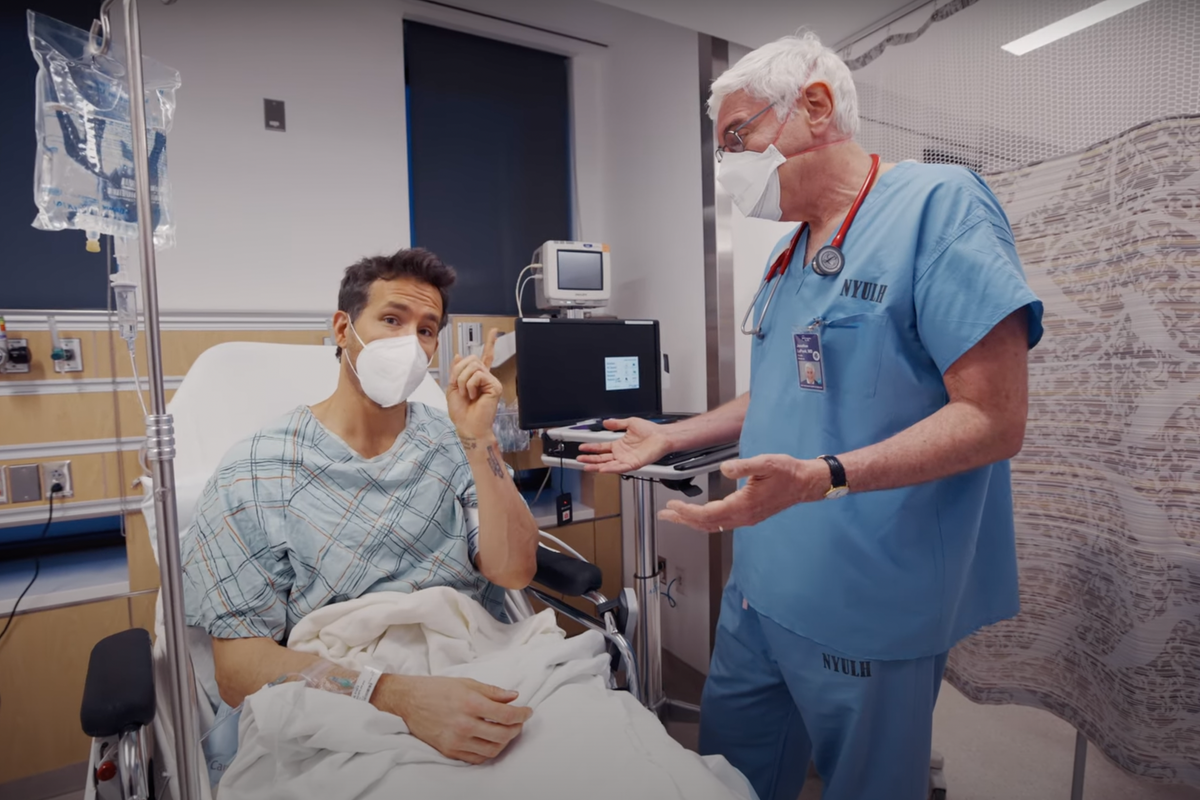Ryan Reynolds got a colonoscopy after losing a bet and found a lifesaving surprise
Only 60% of men over 50 are getting regular colonoscopies. Reynolds just proved why they're important.
Cancer is serious. Ryan Reynolds is not. Luckily his characteristic sense of humor—along with being true to his word—has helped shine a light on a sobering topic in a fun way. First, he made a friendly bet with his Welcome to Wrexham co-star Rob McElhenney of It’s Always Sunny in Philadelphia with whom he also co-owns the Welsh football club Wrexham A.F.C.
The bet? That McElhenney would not be able to learn Welsh, the official language of Wales, where their soccer team is located. The stakes? If Reynolds lost, he'd have to get a colonoscopy... and post the entire thing to YouTube. About 30 seconds into a YouTube upload titled "Rob & Ryan Lead From Behind," McElhenney begins speaking in near-fluent Welsh.
Uh-oh. Colonoscopy it is.

Reynolds is an actor famous for hilarious hijinks. From his intense fictional feud with Hugh Jackman to performing epic pranks on talk shows, he is often the best thing on the internet for a good laugh. However, he is also not one to shy away from difficult conversations, particularly when it comes to health. So raising awareness about the importance of colonoscopies was, as he quipped, “enough motivation for me to let you in on a camera being shoved up my ass.”
Reynolds might have lost the bet, but his actions paid off. The procedure turned out to be lifesaving.
The video shows the Free Guy and Deadpool actor entering the hospital early in the morning, discussing the procedure with the doctor (with just the perfect amount of gallows humor), and being wheeled into the exam room. Reynolds notes that this will be his first colonoscopy.
As Reynolds begins waking up after the roughly 25-minute procedure, the doctor delivers the news that an “extremely subtle” polyp was discovered and cut out. A polyp is a small abnormal growth of tissue that is often benign but can develop into something much scarier if not detected. Reynolds had previously shown no symptoms.
“I’m not being overly dramatic,” his doctor told him. “This is exactly why you do this. You are interrupting the natural history of a disease, of something of a process that could have ended up developing into cancer and causing all sorts of problems. Instead, you are not only diagnosing the polyp, you are taking it out.”
Watch the whole video here:
- YouTubewww.youtube.com
Ever the expert marketer, Reynolds smoothly slid in a quick plug for his alcohol brand, joking that “I can’t believe you pumped all that Aviation Gin into my IV. I was out like a light” before thanking the doctor.
Reynolds got his colonoscopy at 45, which is the recommended age to begin routine screenings. Though it’s a preventable cancer, colorectal cancer is the third most common cause of cancer-related deaths for men and women combined, and it is predicted to be the top cancer killer for people under 50 by the year 2030.
Because of the inherent invasiveness of the procedure, many people feel uncomfortable even talking about colonoscopies, let alone getting one, despite early detection being so vital. A colonoscopy involves the patient being sedated while a long tube is inserted into the rectum, which allows a small video camera to explore the colon and look for cancer or other abnormalities.

Some estimates say only about 60% of men over the age of 50 are following the screening guidelines, with men notoriously being afraid of feeling vulnerable in front of a doctor and also correlating the colonoscopy procedure with a certain sex act. Yes, sadly that's a real fear that has been studied and documented. You'd think not dying of cancer would be more important, but welcome to toxic masculinity.
In a show of good faith and education, McElhenney got a colonoscopy as well for the project, and took a strange pride in having more benign polyps than Reynolds did.

Now, thanks to Reynolds and McElhenney hilariously riffing on their experience and normalizing it, the whole thing might not seem so daunting after all. If a true Marvel superhero can get his regular health screenings, the rest of us should definitely fall in line.
Thanks for the delightfully silly PSA, Ryan.
This article originally appeared three years ago.

